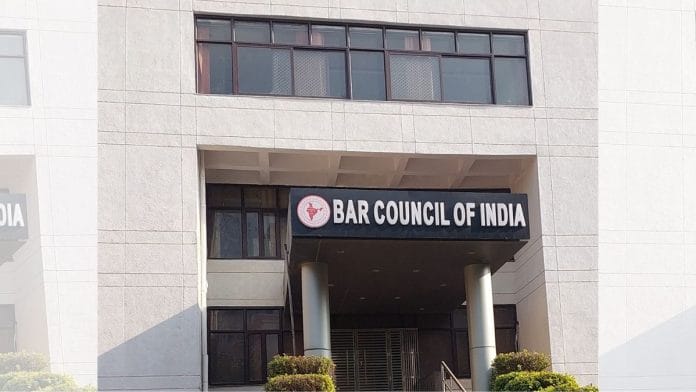New Delhi: The Bar Council of India’s move to approach the Supreme Court with a plea to increase the enrolment fee for lawyers from Rs 750 to Rs 25,000 has drawn flak from the legal fraternity, with many arguing that the sharp hike could be a problem for aspiring lawyers, particularly those from low-income families.
A much higher fee could create a financial barrier to entry into the legal profession, they fear. Furthermore, there are concerns that this rise may be interpreted as a violation of the right to equality and right to practice a profession, under Article 14 and Article 19 (1) (g) of the Constitution.
BCI is a statutory body established under the Advocates Act of 1961 to govern legal practice and education in India. It establishes professional conduct norms, has disciplinary authority over lawyers and establishes criteria for legal education.
BCI’s plea in the apex court asks for a change in the 1961 Act to allow the fee hike. The existing fee structure of Rs 750, it said, is not enough to support all of its activities, including vital ones, like infrastructure upkeep, legal aid and legal profession regulation.
Notably, in July 2024, the Supreme Court had ruled that BCI cannot charge more than what is prescribed in the 1961 law. However, in the current plea, the regulatory body wants the court to direct the government to amend the law to revise the fee.
The top court is yet to hear the BCI’s petition, but the regulator’s move has become a flashpoint for larger concerns in the legal profession, such as accessibility, equity and the council’s accountability. While it claims that the increase is necessary, the legal community has voiced a common demand—greater justice and transparency in deciding the profession’s future.
Also Read: As SC Collegium considers proposal to tackle nepotism, how the bar views the possible move
‘Unrealistic demand’
Noted advocate Prashant Bhushan sees BCI’s move as unreasonable. “Young lawyers should not be having to pay an exorbitant amount of money to get themselves enrolled. There is no reason why BCI should be charging this much. except for paying for their corruption,” he said.
Echoing Bhushan’s concerns, another senior lawyer Ranji Thomas cautioned against imposing a high fee, calling it an “unrealistic demand”. “It would effectively deprive many aspiring lawyers from underprivileged backgrounds from pursuing their profession,” he said.
Sanjoy Ghose pointed to broader concerns about access and equality, saying that an exorbitant enrolment fee would make the legal profession more “oligarchic and less meritocratic”. This would force ordinary law graduates to seek financial help from family and friends, the senior advocate said. “BCI is unable to assure and ensure minimum wages for young lawyers.”
Another lawyer, Nizam Pasha, slammed BCI’s move saying that it was “not in keeping with the separation of powers under the Constitution”. He argued that BCI should approach the Union Government to move an amendment to the Advocates Act, and not file an application in the court to direct the Centre to do so.
“Courts cannot issue a mandamus to the executive or Parliament on matters of legislative policy.”
Adding another layer of criticism, senior advocate Gopal Sankaranarayanan demanded greater accountability and transparency from the BCI on usage of funds.
“The BCI first has to be accountable to advocates, have regular and transparent elections, and proper audited accounts to reveal how the money from lakhs of lawyers has been spent all these years. They make money through college inspections, bridge courses, the All India Bar Exam and stipends for governing council meetings. Where are the details of how that money is spent?” he asked.
Advocate Abhishek Goel remarked that the BCI’s proposal is against the principles of natural justice. “A lot of people who qualify as lawyers come from humble backgrounds. The amount of Rs 25,000 may strain them further. This demand is not justified, as it would make it tough for people to enrol and practice as advocates, ultimately affecting accessibility to justice.”
Although Thomas acknowledged the need for some revision in the fee, he deemed the proposed hike excessive, calling it impractical and potentially detrimental to the accessibility of the legal profession. He advocated for a more gradual approach with periodic reviews, arguing that a sudden jump would be unrealistic and unacceptable for most aspiring lawyers.
Abhik Chimni also called for a more measured approach to fee revision. He said, “The hike now is sudden and exorbitant, which will not allow many students to enrol. Most importantly, the elephant in the room must be addressed—the BCI has done almost nothing for law students and lawyers. This needs serious reform.”
In a strongly worded critique, Kamlesh Kumar Mishra advocated for enrolment to be made free of cost. He took a swipe at BCI’s leadership, remarking, “It is absolutely not justified to charge exorbitant amounts for enrolment from young members entering the bar. The chairman of BCI, who is the blue-eyed boy of the Modi government and praises it in official programmes as their mouthpiece, should instead ask the central government for the legislative changes, rather than approaching the Supreme Court.”
The Print has reached out to the BCI for a comment on this proposal. This report will be updated as and when the response is received.
Also Read: ‘No shortcuts’: Tracing delivery boy-turned-civil judge Muhammed Yaseen’s journey to success






